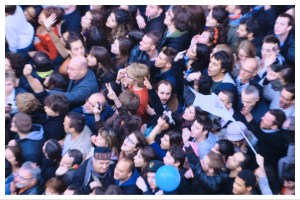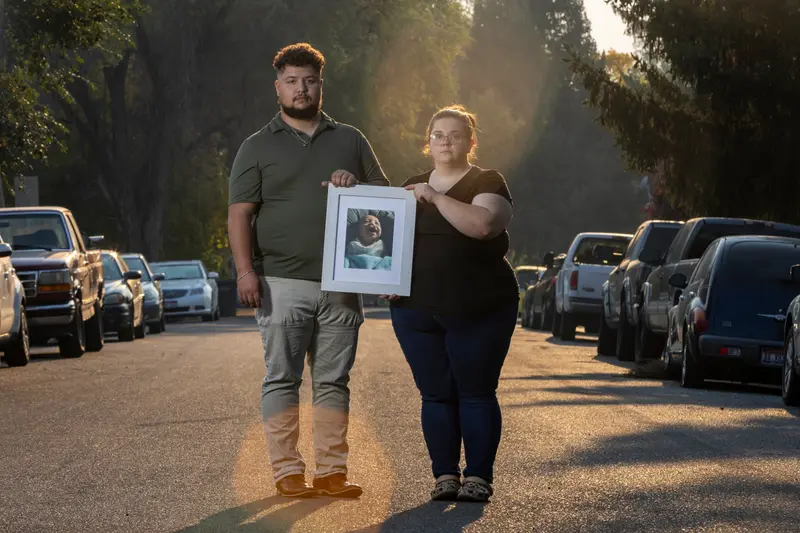A regular on the red carpet this time last year as she participated in the 2023-2024 awards season with Anatomy of a Fall, Justine Triet has been off the circuit since the spring as she writes two new projects.
The director – who shared the Academy Award and Golden Globe for best screenplay with Arthur Harari for her Cannes Palme d’Or winning courtroom drama – took a breather from her writing this weekend to attend the Marrakech Film Festival.
Triet would not divulge details on her new features projects but did do a deep dive into her earlier career in an onstage conversation, moderated by her long-time producer Marie-Ange Luciani at Paris-based Les Films de Pierre.
The conversation touched on how Triet had first attempted to forge a career in documentary. Asked why she had abandoned non-fiction, she replied: “In all honesty, money, I was making a really, really bad living making documentaries and being threatened with lawsuits.”
“I said to myself, frankly this is depressing. I’m making zero money. I’m poor. I’ve got hundreds of rushes, and I’ve just had a guy nearly kill me because I was filming a young teenager who was fantastic,” she said continued without going into details over the brush with death.
Her last documentary was the 2010 work Shadows in the House, about a female evangelist and social worker based in poor part of São Paulo.
“I was 27, maybe 28, and I needed money, so I left for Brazil where they put me in a favela, in a place that was extremely dangerous,” she recounted. “I like this film a lot, but it hasn’t been seen much.”
“It was after that that a producer said to me, ‘What you’re doing is almost fiction.’ In fact, I had started to direct the real woman… saying to her to do this or that, when it was her real life.”
Triet’s first fiction feature Age of Panic (La Bataille de Solferino) saw the filmmaker stay close to her documentary roots. The film stars Laetitia Dosch as a TV reporter juggling work commitments, motherhood and a toxic relationship with a needy ex-partner, played by Vincent Macaigne.

Age of Panic
Shellac
The drama plays out and was shot against the backdrop of jubilant public celebrations for President François Hollande’s presidential victory on May 6, 2012, as Laetitia’s character covers the event with a domestic crisis in the backdrop.
“It was great fun to make. We pretended to be real journalists with false press cards. Everything was false,” said Triet, revealing that Macaigne was nearly ejected from the crowd several times, following scenes in which he was haranguing Laetitia.
“People thought he was a real threat,” said Triet. “It was a mess to manage, but on seeing these images, I remember the actors had fun. They were improvising while the people around them are not extras, but real people… but in a way, they’re also playing to the camera.
The film shot over 20 days, but that day alone, there were 20 hours of rushes shot by eight cameras positioned around the area.
“I’m not sure if I could make a film like that today,” said Triet. “It’s also troubling to see it now, because there are already some of my obsessions… in this extremely intimate situation between these two people, playing out in a much broader and much bigger picture.”
Looking at the body of her work, Triet said she trod a fine line between drawing on aspects of her own life and elements of the reality around her and creating a fictitious story or character.
“What is very difficult is to not be eaten by your films, but that’s the same for actors, actresses,” she said. “It’s a mixture of intimate things… but there is also the idea of warding off fate by making a film, even if sometimes we don’t succeed… In any case, catharsis is really something that I love… taking something small from inside and making it implode in my films.”
Triet said sound was also an important element of how she constructed a story, screenplay and a film.
“I started out as musician, so I have a relationship with sound. When I edit my films, I hardly look at the images, I do the cuts on the basis of the sound. Sound is extremely important for me. My favorite films, I listen to them rather than watching them. When I’m driving, I’ll often listen to a film.”
The conversation also touched on Triet’s first collaboration in her third film Sibyl with Sandra Hüller, who went on to be Oscar nominated for her performance in Anatomy of a Fall.

Sibyl
Les Films Pelléas
The German actress had a secondary role in the drama, starring Virginie Efira as a psychotherapist who is losing her grip, playing a highly strung film director whose shoot on a boat off the Italian island of Stromboli does not go as planned.
Triet said the real-life shooting of the scene in which Hüller’s character implodes over a love scene, was also fraught due to sea sickness among the crew and a tetchy boat owner, but marked a turning point in her admiration of the actor.
“All the actors were really impressed because she was very, very shy. We had been on Stromboli for a few days, but she was very secretive, and we never saw her. I was even wondering if she were okay,” recounted Triet. “Everyone else was really connected. And it’s true in this scene, it was if she were born a little for everyone. There was really a kind of before and after this scene.”
“We had a very strong connection, from when we met, a bit like with Virginie [Efira],” she continued. “We understand each other really well and manage to get a little into each other’s brains. What also touched me a lot about Sandra was that actors can get upset by smaller roles and this was not the case with her. She invested herself completely in the role, even though she was on the shoot for very few days. I was surprised by that.”







